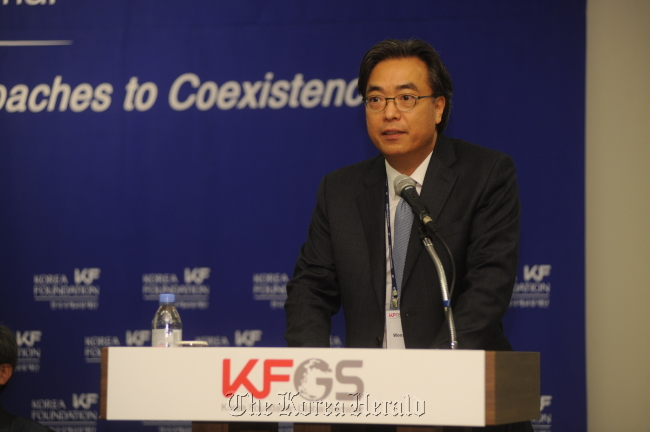Immigration policy needs urgent attention: KF chief
By Shin Hyon-heePublished : Nov. 30, 2012 - 19:07
With its population becoming more multicultural and aging rapidly, Korea should debate more vigorously ways to embrace immigrants and foster inclusive growth, Kim Woo-sang, president of the Korea Foundation, said Friday.
As the number of foreign residents steadily grows, the mainstay of policy discourses has shifted from whether to accept migrants to how best to accommodate them, he told a forum on multiculturalism in Seoul.
“Accommodation and integration of intercultural differences into national, regional, and global communities is no less serious policy challenge many of us are facing in different parts of the globe,” he said.
As the number of foreign residents steadily grows, the mainstay of policy discourses has shifted from whether to accept migrants to how best to accommodate them, he told a forum on multiculturalism in Seoul.
“Accommodation and integration of intercultural differences into national, regional, and global communities is no less serious policy challenge many of us are facing in different parts of the globe,” he said.

“I believe that open intellectual communication, and knowledge and experience sharing could help find ways toward the solution.”
The seminar is part of the state-run public diplomacy institution’s five-day conference on the opportunities and challenges of a multicultural world. The annual event was co-hosted by Korea University’s Asiatic Research Institute and the Geneva-headquartered International Organization for Migration.
The number of foreign residents in Korea tops 1.2 million at present, making up about 2.5 percent of the population, government data shows. About 44 percent of them are migrant workers primarily from China and nearly 30 percent have come here through marriage.
To help them better settle and adjust, the government needs to boost support for multicultural families and reinforce cooperation with neighbor countries, Kim said.
“We must take the initiative on such human security issues of the global society as multiculturalism,” he said.
“The main members of the immigrants in our society are from our middle power neighbors in the region, with which Korea must cooperate together as the same members of the like-minded middle power community.”
More than 50 policymakers, academics and government officials from 20 countries participated in the forum to discuss citizenship, settlement, integration, labor mobility, intermarriage, economic impact, cultural diversity and identity. Three working groups will draw up policy recommendations later on.
Participants include Will Kymlicka, a political philosophy professor at Queen’s University in Canada; Demetrios Papademetriou, president and co-founder of the Migration Policy Institute in Washington; and Warren Pearson, assistant secretary of Australia’s Department of Immigration and Citizenship.
Vice Justice Minister Ghil Tae-ki, National Assembly Speaker Kang Chang-hee and Philippine-born Korean lawmaker Jasmine Lee also delivered a speech.
By Shin Hyon-hee (heeshin@heraldcorp.com)





![[Weekender] How DDP emerged as an icon of Seoul](http://res.heraldm.com/phpwas/restmb_idxmake.php?idx=644&simg=/content/image/2024/04/25/20240425050915_0.jpg&u=)


![[Music in drama] An ode to childhood trauma](http://res.heraldm.com/phpwas/restmb_idxmake.php?idx=644&simg=/content/image/2024/04/25/20240425050929_0.jpg&u=)








![[Herald Interview] Mistakes turn into blessings in street performance, director says](http://res.heraldm.com/phpwas/restmb_idxmake.php?idx=652&simg=/content/image/2024/04/28/20240428050150_0.jpg&u=20240428174656)
